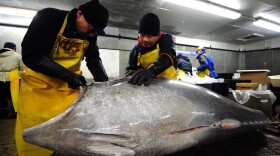Fred Bever
A Columbia University graduate, Fred began his journalism career as a print reporter in Vermont, then came to Maine Public in 2001 as its political reporter, as well as serving as a host for a variety of Maine Public Radio and Maine Public Television programs. Fred later went on to become news director for New England Public Radio in Western Massachusetts and worked as a freelancer for National Public Radio and a number of regional public radio stations, including WBUR in Boston and NHPR in New Hampshire.
Fred formerly was Maine Public Radio’s chief political correspondent from 2001 to 2007 and returned to Maine Public Radio in early 2016 as a news reporter and producer, covering a wide variety of topics across Maine and the region.
-
After decades with no sign of a lethal neurotoxin, the algae that produces it is now plaguing the warming waters of the Gulf of Maine, forcing unprecedented closures in shellfish harvesting.
-
New England fishers say it's been decades since they've hauled in so many tuna, and some in the industry are urging higher quotas. But some environmental groups fear the population is still imperiled.
-
If you've ever dreamed of the good life on one of Maine's coastal islands, be forewarned: the Internet ranges from lousy to nonexistent.
-
Begging is an ancient practice, and in recent years U.S. cities have been cracking down on panhandlers. But now a handful are trying a different approach — paying panhandlers to work.
-
The number of H-2B visas available to foreigners seeking work in the U.S. is down from last year. A Maine hotel owner is among those worried about finding enough workers to stay open over the summer.
-
A trawling experiment in the Gulf of Maine aims to scoop up abundant and profitable flatfish, while bypassing the once plentiful but now depleted cod population. So far, the results are promising.
-
The recovery of the bald eagle is bad news for herons, loons and other rare birds. Their numbers are being decimated by eagles who prey upon them.
-
Why are chefs adopting sea greens in their cuisine? They're tasty and nutritious, and growing them is good for the planet. Maine's budding seaweed business is boosting an endangered coastal economy.
-
U.S. drug officials have traced a sharp spike in the already climbing death toll from heroin overdoses to an additive — acetyl fentanyl. The fentanyl is being cooked up in clandestine labs in Mexico.
-
Women play an outsized role in the underground firearms marketplace. Often they handle illegal guns that are not for for their own use, but for men close to them. One Boston program is campaigning against gun violence, drawing connections between "crime guns" and domestic violence.








